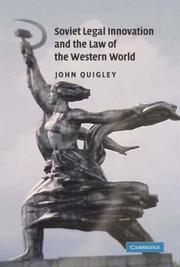| Listing 1 - 10 of 24 | << page >> |
Sort by
|
Book
ISBN: 9780521151658 0521151651 9780521768115 9780511779763 Year: 2010 Publisher: Cambridge Cambridge University Press
Abstract | Keywords | Export | Availability | Bookmark
 Loading...
Loading...Choose an application
- Reference Manager
- EndNote
- RefWorks (Direct export to RefWorks)
Palestinian Arabs --- Arab-Israeli conflict --- Jewish-Arab relations --- Palestiniens --- Conflit israélo-arabe --- Relations judéo-arabes --- Legal status, laws, etc. --- Droit --- Palestine --- Politics and government --- International status. --- Politique et gouvernement --- Statut international --- Conflit israélo-arabe --- Relations judéo-arabes
Book
ISBN: 1139035940 110720920X 1283054558 9786613054555 0511779763 1139041401 1139042173 113904480X 1139038265 1139040634 9781139042178 9780511779763 9780521151658 0521151651 9780521768115 052176811X 9781139035941 9781283054553 6613054550 9781139041409 9781139038263 9781139040631 Year: 2010 Publisher: Cambridge New York Cambridge University Press
Abstract | Keywords | Export | Availability | Bookmark
 Loading...
Loading...Choose an application
- Reference Manager
- EndNote
- RefWorks (Direct export to RefWorks)
Palestine as a territorial entity has experienced a curious history. Until World War I, Palestine was part of the sprawling Ottoman Empire. After the war, Palestine came under the administration of Great Britain by an arrangement with the League of Nations. In 1948 Israel established itself in part of Palestine's territory, and Egypt and Jordan assumed administration of the remainder. By 1967 Israel took control of the sectors administered by Egypt and Jordan and by 1988 Palestine reasserted itself as a state. Recent years saw the international community acknowledging Palestinian statehood as it promotes the goal of two independent states, Israel and Palestine, co-existing peacefully. This book draws on evidence from the 1924 League of Nations mandate to suggest that Palestine was constituted as a state at that time. Palestine remained a state after 1948, even as its territory underwent permutation, and this book provides a detailed account of how Palestine has been recognized until the present day.
Palestinian Arabs --- Legal status, laws, etc. --- Palestine --- International status. --- Law --- General and Others
Book
ISBN: 1139611194 1107237963 1139626078 1139616773 1139613057 113942453X 1107254973 1139622358 1283943573 9781139626071 9781139424530 9781139613057 9781139616775 9781107032064 1107032067 9781107610026 1107610028 Year: 2013 Publisher: Cambridge New York Cambridge University Press
Abstract | Keywords | Export | Availability | Bookmark
 Loading...
Loading...Choose an application
- Reference Manager
- EndNote
- RefWorks (Direct export to RefWorks)
The war of June 1967 between Israel and Arab states was widely perceived as being forced on Israel to prevent the annihilation of its people by Arab armies hovering on its borders. Documents now declassified by key governments question this view. The UK, USSR, France and the USA all knew that the Arab states were not in attack mode and tried to dissuade Israel from attacking. In later years, this war was held up as a precedent allowing an attack on a state that is expected to attack. It has even been used to justify a pre-emptive assault on a state expected to attack well in the future. Given the lack of evidence that it was waged by Israel in anticipation of an attack by Arab states, the 1967 war can no longer serve as such a precedent. This book seeks to provide a corrective on the June 1967 war.
Israel-Arab War, 1967 --- Self-defense (International law) --- International law --- Arab-Israel War, 1967 --- Six Day War, 1967 --- Arab-Israeli conflict --- Law and legislation. --- Law --- General and Others

ISBN: 1107185106 113913342X 1281085251 9786611085254 0511342144 0511511213 051134161X 0511341032 0511342675 9780511342677 9780511511219 9780521881746 0521881749 9781107406254 1107406250 9781107185104 9781281085252 6611085254 9780511342141 9780511341038 Year: 2007 Publisher: Cambridge New York Cambridge University Press
Abstract | Keywords | Export | Availability | Bookmark
 Loading...
Loading...Choose an application
- Reference Manager
- EndNote
- RefWorks (Direct export to RefWorks)
This book was first published in 2007. The government of Soviet Russia wrote new laws for Russia that were as revolutionary as its political philosophy. These new laws challenged social relations as they had developed in Europe over centuries. These laws generated intense interest in the West. To some, they were the harbinger of what should be done in the West, hence a source for emulation. To others, they represented a threat to the existing order. Western governments, like that of the Tsar, might be at risk if they held to the old ways. Throughout the twentieth century Western governments remade their legal systems, incorporating an astonishing number of laws that mirrored the new Soviet laws. Western law became radically transformed over the course of the twentieth century, largely in the direction of change that had been charted by the government of Soviet Russia.
Law --- Law and socialism. --- Law reform. --- Comparative law. --- International law --- Law of nations --- Nations, Law of --- Public international law --- Communism and law --- Law and communism --- Marxian jurisprudence --- Marxist jurisprudence --- Marxian legal theory --- Marxist legal theory --- Socialism and law --- Socialism --- Comparative jurisprudence --- Comparative legislation --- Jurisprudence, Comparative --- Law, Comparative --- Legislation, Comparative --- Legal reform --- Jurisprudence --- Philosophy. --- Soviet Union --- History --- Influence. --- Influence --- General and Others
Book
ISBN: 1108552447 1108656595 1108428231 1108446779 110864225X Year: 2018 Publisher: Cambridge : Cambridge University Press,
Abstract | Keywords | Export | Availability | Bookmark
 Loading...
Loading...Choose an application
- Reference Manager
- EndNote
- RefWorks (Direct export to RefWorks)
Capital cases involving foreigners as defendants are a serious source of contention between the United States and foreign governments. By treaty, foreigner defendants must be informed upon arrest that they may contact a consul of their home country for assistance, yet police and judges in the United States are lax in complying. Foreigners on America's Death Row investigates the arbitrary way United States police departments, courts, and the Department of State implement well-established rights of foreigners arrested in the US. Foreign governments have taken the United States into international courts, which have ruled that the US must enforce the treaty. The United States has ignored these rulings. As a result, foreigners continue to be executed after a legal process that their home governments justifiably find to be flawed. When one country ignores the treaty rights of another as well as the decisions of international courts, the established order of international relations is threatened.
Capital punishment --- Right to counsel --- Foreign law, Pleading and proof of. --- Conflict of laws --- Defense (Criminal law) --- Evidence (Law) --- Judicial notice --- Pleading --- Jurisdiction

ISBN: 0822386763 0822335271 0822335395 Year: 2005 Publisher: Durham : Duke University Press,
Abstract | Keywords | Export | Availability | Bookmark
 Loading...
Loading...Choose an application
- Reference Manager
- EndNote
- RefWorks (Direct export to RefWorks)
John Quigley brings a necessary international law perspective to bear on the seemingly intractable Israeli-Palestinian conflict in this updated edition of his important book. Since 2000, the cycle of bloodshed and retribution has spiraled increasingly out of control. Quigley attributes the breakdown of negotiations in 2000 to Israel’s unwillingness to negotiate on the basis of principles of justice and law. He argues that throughout the last century, established tenets of international law—and particularly the right of self-determination—have been overlooked or ignored in favor of the Zionists and then the Israelis, to the detriment of the Palestinians.In this volume, Quigley provides a thorough understanding of both sides of the conflict in the context of international law. He contends that the Palestinians have a stronger legal claim to Jerusalem than do the Israelis; that Palestinian refugees should be repatriated to areas including those within the borders of Israel; and that Israel should withdraw from the territory it occupied in 1967. As in his earlier volume, Quigley provides an extensively documented evaluation of the conflict over the last century, discussing the Zionist movement, the League of Nations’ decision to promote a Jewish homeland in Palestine, the 1948 war and creation of Israel, and Israel’s occupation of the West Bank, Gaza Strip, and Golan Heights during the 1967 war.
Arab-Israeli conflict. --- Palestinian Arabs --- Arabs --- Arabs in Israel --- Israeli Arabs --- Israel-Arab conflicts --- Israel-Palestine conflict --- Israeli-Arab conflict --- Israeli-Palestinian conflict --- Jewish-Arab relations --- Palestine-Israel conflict --- Palestine problem (1948- ) --- Palestinian-Israeli conflict --- History --- Israel --- West Bank. --- Gaza Strip. --- Qiṭāʻ Ghazzah --- Retsuʻat ʻAzah --- Palestine --- Ḍaffah al-Gharbīyah --- Gadah ha-maʻaravit --- Judaea and Samaria --- Judea and Samaria --- West Bank of the Jordan River --- Yehudah ṿeha-Shomron --- History.
Book
ISBN: 100902308X 1009020870 1316519244 1009020676 Year: 2022 Publisher: Cambridge : Cambridge University Press,
Abstract | Keywords | Export | Availability | Bookmark
 Loading...
Loading...Choose an application
- Reference Manager
- EndNote
- RefWorks (Direct export to RefWorks)
In The Legality of a Jewish State, the author traces the diplomatic history that led to the partition of Palestine in 1948 and the creation of Israel as a state. He argues that the fate of Palestine was not determined on the basis of principle, but by the failure of legality. In focusing on the lawyer-diplomats who pressed for and against a Jewish state at the United Nations, he offers an explanation of the effort in 1947-48 by Arab states at the UN to gain a legal opinion from the International Court of Justice about partition and the declaration of a Jewish state. Their arguments at that time may surprise a twenty-first-century reader, touching on issues that are still at the heart of the contemporary conflict in the Middle East.
Arab-Israeli conflict --- Law and legislation. --- Israel --- Palestine --- International status. --- Israel-Arab conflicts --- Israel-Palestine conflict --- Israeli-Arab conflict --- Israeli-Palestinian conflict --- Jewish-Arab relations --- Palestine-Israel conflict --- Palestine problem (1948- ) --- Palestinian-Israeli conflict --- Palestinian Arabs --- History --- Dawlat Isrāʼīl --- Država Izrael --- Dzi︠a︡rz︠h︡ava Izrailʹ --- Gosudarstvo Izrailʹ --- I-se-lieh --- Israele --- Isrāʼīl --- Isŭrael --- Isuraeru --- Izrael --- Izrailʹ --- Medinat Israel --- Medinat Yiśraʼel --- Stát Izrael --- State of Israel --- Yiselie --- Yiśraʼel --- Ισραήλ --- Израиль --- Государство Израиль --- Дзяржава Ізраіль --- Ізраіль --- מדינת ישראל --- ישראל --- إسرائيل --- دولة إسرائيل --- イスラエル --- 以色列
Book
ISBN: 1839984643 1839984651 1839984635 9781839984655 9781839984648 Year: 2023 Publisher: London : Anthem Press,
Abstract | Keywords | Export | Availability | Bookmark
 Loading...
Loading...Choose an application
- Reference Manager
- EndNote
- RefWorks (Direct export to RefWorks)
Analysis of Britain's role in Palestine has proceeded on the assumption that Britain was lawfully in control of the territory. Analysts differ on whether what it did was proper, but they agree that Britain had a lawful mandate and that through the League of Nations, and that the international community advocated for Jewish territorial rights in Palestine. This analysis, though widely shared, is incorrect. Britain had no territorial rights itself to govern Palestine. It was there by dint of force of arms. The mandate it had over Palestine was initiated unilaterally. The mandate was not given to Britain by the League of Nations. The League of Nations had no authority over Palestine and, in particular, nothing it could give to Britain. The document that Britain composed for the governance of Palestine was never approved by the League of Nations.
Mandates --- Imperialism --- History --- Great Britain --- Foreign relations --- Mandates, Colonial --- Mandates, International --- Colonies --- International trusteeships --- Law and legislation --- Palestine --- Politics and government
Book
ISBN: 9781009023085 9781316519240 9781009010115 Year: 2022 Publisher: Cambridge Cambridge University Press
Abstract | Keywords | Export | Availability | Bookmark
 Loading...
Loading...Choose an application
- Reference Manager
- EndNote
- RefWorks (Direct export to RefWorks)
Book
ISBN: 9781839984648 9781839984631 Year: 2023 Publisher: London Anthem Press
Abstract | Keywords | Export | Availability | Bookmark
 Loading...
Loading...Choose an application
- Reference Manager
- EndNote
- RefWorks (Direct export to RefWorks)
| Listing 1 - 10 of 24 | << page >> |
Sort by
|

 Search
Search Feedback
Feedback About UniCat
About UniCat  Help
Help News
News